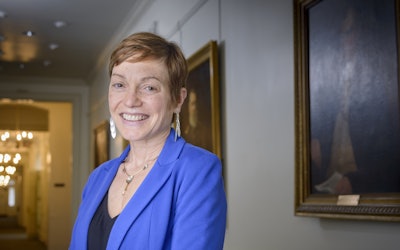Over the last year, COVID-19 has put many prison education programs on pause due to visitation limitations and lack of internet access.
 Dr. Julie Wollman
Dr. Julie WollmanHowever, through a longstanding partnership between Widener University and Chester State Correctional Institution in Pennsylvania (SCI-Chester)—an all-male correctional facility—remote learning was modified to meet the needs of students behind bars.
Shifting to a correspondence course model, all work goes through Corrections School Principal Taneisha Spall, who passes along feedback. Faculty members also meet with the incarcerated men over occasional Zoom meetings.
“Not seeing each other weekly in class has been challenging but we adapted and persisted, just like everyone else has done throughout the pandemic,” said Dr. Julie Wollman, president of Widener University. “We were committed to moving forward and we succeeded in that.”
Of the six colleges and universities who previously worked with SCI-Chester, Widener was the only institution to continue offering their program during COVID-19. That was in part due to Wollman’s leadership.
 Taneisha Spall
Taneisha SpallSince arriving at Widener over five years ago, she has been heavily involved at SCI-Chester as both a teacher and advocate. After discovering that the incarcerated men were not receiving college credit for their work, she made changes. Now, incarcerated students are able to earn transferable college credit at no cost due to volunteer efforts. Since the program does not offer a full-time degree, incarcerated men are advised by the university upon their release on available educational pathways.
Currently, the school is in the process of developing a Writing Center within the prison to create mentorship opportunities. Wollman also plans to seek grants to fund a full-time degree or certificate program.
“The experience working with the partnership has been beneficial to all who participate; the men, Widener staff, students and myself,” said Spall. “The dedication shown by Dr. Wollman and her team extends beyond the classroom. Their empathy and understanding of the men, despite their current situation, is what truly makes the men feel as though they can write freely without judgment and be receptive to the feedback of their writing.”
Though some classes are specifically for the incarcerated men, Inside-Out designed courses are also open to Widener undergraduate students.
“Both are very powerful models as both create rich learning spaces for all involved, breaking down stereotypes and making space to open up and be vulnerable in a context where that could otherwise be dangerous,” said Wollman.
Dr. Brenda Kucirka, an associate professor of nursing at Widener, teaches an Inside-Out course titled, “Social Justice and Advocacy.” Consisting of both incarcerated and undergraduate students, she has seen first-hand the transformative impact the course has made on their personal growth and self-confidence.
 Dr. Brenda Kucirka
Dr. Brenda Kucirka“Many have experienced significant adverse childhood experiences and trauma,” she said. “Writing offers them a way to process these experiences. I believe that through writing and retelling their story, they are able to step away from it and see it and themselves from a different perspective.”
Kucirka, alongside Wollman and Jayne Thompson, an assistant teaching professor of English at Widener, also each teach a four-week module as part of the “Writing My Life” course. In her section focused on advocacy writing, Kucirka encourages her students to submit their work to be featured in The Marshall Project’s first-person essay series “Life Inside.”
Outside of reduced “real time interactions,” unforeseen emergencies and schedule changes within the prison also creates a challenge to learning, according to Wollman.
Beyond the skills developed in the classroom, prison education programs have been shown to reduce recidivism rates by 43%, the Bureau of Justice Statistics reported.
“There is no better way to provide rehabilitative opportunities to incarcerated individuals who seek to recognize their past and to change their behaviors and address their physical and mental health challenges than education…,” said Wollman. “We learn so much from the men about their experiences and how they make sense of them and turn them to positive goals. They are an inspiration and it is an honor to work with them.”
Seeing her students’ desire and passion for learning, Kucirka recognizes the “power” of education. However, it also leaves her with a question, “what would happen if education in prison was the rule rather than the exception?”
“It strikes me as profoundly sad that there is so much potential locked away,” said Kucirka. “There are so many incarcerated individuals who have much to offer…I believe that by providing more opportunity to address educational needs and life goals of those behind bars, we can change the future trajectory for returning citizens and help to unearth their potential and build healthier communities.”
Sarah Wood can be reached at [email protected].





















